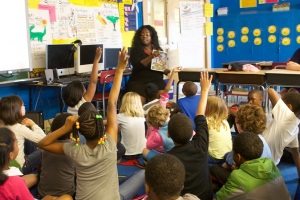An Opportunity to Build Better Education for All

Photo Credit: Emily Banks from the U.S. Department of Education
*Originally posted on Medium
Helping educators develop culturally responsive teaching competencies is key
Good teachers know that learning requires context, adaptability, and flexibility. They know that to reach their students in an impactful way, they need to shape their teaching to the needs of their students: their lived experiences, their prior knowledge, their culture, and their context. These are the characteristics of culturally responsive teaching, which is accepted by a wide range of educators, encouraged by state statutes, and backed by research.
In fact, according to a 2019 report from New America Foundation, 42 of 50 states have codified learning outcomes and standards around culturally responsive teaching, and another 46 of 50 around diversity and representation in the classroom. Virtually all states across the political spectrum from New York to Utah and Texas to California require that teachers demonstrate some combination of culturally responsive teaching competencies, because they recognize it builds classrooms where students feel valued and engaged.
The term “culturally relevant teaching” was coined over 30 years ago by educator Dr. Gloria Ladson-Billings (later adapted into culturally responsive teaching by Geneva Gay) to describe the practice of drawing on students’ experiences and culture to shape curriculum: bringing real-word issues into the classroom, modeling high expectations for all students, and promoting respect for students’ differences. When it’s done well, culturally responsive teaching - and culturally responsive teachers - can have enormous benefits on the success of students by:
-
Strengthening reading comprehension and mathematical thinking by placing new information within existing neural pathways and styles of learning
-
Improving attendance and classroom engagement by connecting learnings to everyday implications and situations that students encounter
-
Cultivating critical thinking and problem-solving skills by engaging students in rigorous, project-based activities that intersect with challenges in today’s society
-
Celebrating the value and contribution of diverse groups to disrupt stereotypes and fortify students against racial discrimination
-
Promoting a sense of safety and belonging by demonstrating care, encouraging socialization among students, and establishing respectful relationships with learners.
For all these reasons, culturally responsive teaching is widely recognized and integrated into state teaching standards. Contrast that with a recent study in Education Week that found that just 14% of teachers feel like they have adequate training and resources to implement these practices. They are grappling with capacity and funding cuts, pandemic learning, mounting political pressures, and they’re faced with a system that is too often oriented towards a one-size-fits-all approach in which learning resources and classroom practices only reflect some of us and some of our needs.
It is especially poignant across racial lines - black, brown, and indigenous learners are vastly under-reflected in learning materials and within the teaching profession - but it’s also about geographic differences, gender and sexual identity, socioeconomics, religion, and more. All our students should be reflected in our education systems, and when they aren’t, it undermines our ability to get today’s learners the education they deserve.
Helping educators incorporate more culturally responsive teaching practices in the classroom is essential to overcoming those gaps and building a more just and equitable future. In working with teachers, librarians, and technology specialists, we have seen first-hand the value of introducing learning materials that resonate and connect with students from diverse cultural backgrounds.
However, the adaptability, flexibility and responsiveness that are required to do this well are not permitted by traditionally published “All Rights Reserved” commercial textbooks and teaching resources. For example, traditional textbooks cannot be revised to include nearby landmarks, cultural references, or local figures. Alternatively, Open Educational Resources (OER) are free for educators to download, share, and adapt, ensuring that all students have equal access to quality learning materials. Furthermore, we’ve seen first-hand how educators who work with OER become empowered to customize and contextualize learning materials for themselves and their students. Therefore, this combination – of OER and culturally responsive teaching – creates significant opportunities for education to better meet local learning needs and more deeply value the diversity and identity of all learners.
Teachers tell us that participation in workshops focused on creating culturally responsive teaching materials through the use of OER have resulted in transformational changes in the way they view their own instruction. Evaluation data from recent state-level trainings also demonstrate the importance of teacher access to openly licensed and adaptable examples of culturally responsive materials and tools. This is particularly true in STEM, where there are some free, culturally responsive teaching resources exist, but most learning materials are not openly licensed or adaptable. All and all, across many subject areas, teachers describe the need for additional support around how they plan and develop curriculum, with a focus on gathering and drawing on students’ backgrounds to create culturally affirming lessons.
Now more than ever, there is an urgent need to build towards an education system that our learners deserve—we need to support states, districts, and institutions in developing the culturally responsive teaching competencies to meet their learning outcomes and standards. This means introducing teaching approaches and high-quality learning tools that make learning more student-centered and giving hands-on support to educators to incorporate these practices. That’s how we help teachers be the best teachers they can be, and give our students a vibrant, affirming education.
Lisa Petrides is CEO and founder and Ethan Senack is chief of staff at the Institute for the Study of Knowledge Management in Education (ISKME), the Half Moon Bay, CA-based nonprofit that works to make learning and knowledge-sharing participatory, equitable, and open, and supports innovative research, policy and practice through open education.




